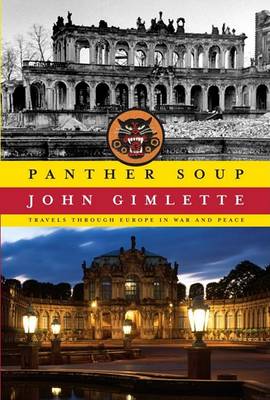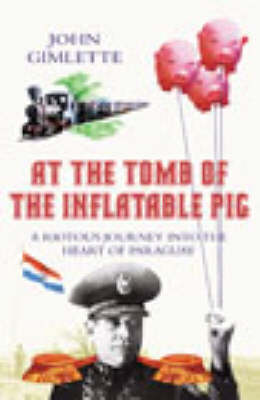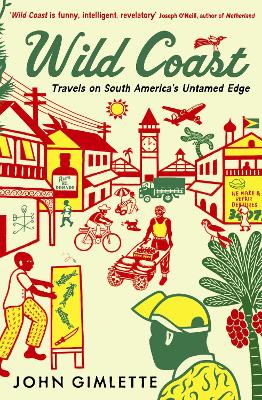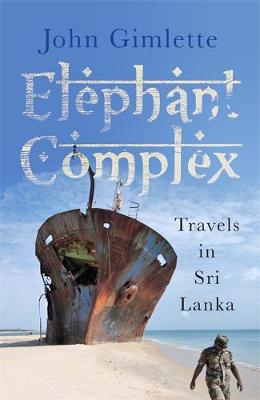Vintage Departures
5 total works
By the end of World War II much of Western Europe was in chaos. The future of our world had been contested here, in the hinterlands of France and across the German plains. But what's become of the battlefields now? Or the people that lived on them? And is there any trace of the 2.7 million Americans who smashed their way into the Reich (or the 12 million that followed)? With questions like these, the award-winning travel writer, John Gimlette, sets off on an astonishing journey into the past.Beginning in Marseille and ending in the Austrian Tyrol, these are travels through some of the most spectacular landscapes in the world, and through cities that have risen from cinders. Along the way, Gimlette explores old camps and drinking dens, delves into the murky sub-culture of the war, and visits towns still reeling from the trauma. There's a rich cast of survivors too: veterans, prisoners, a heroine of the resistance, a few charlatans, Rommel's son, an Austrian chatelaine and of course the children of the blitz. "Panther Soup" is the story of these encounters, a tale as bleak and absurd as war itself. But this is also an uplifting tale of recovery, friendship and regeneration.Foremost amongst the survivors is an American called Putnam Flint.
Sixty years earlier, Flint had fought with the tank destroyers (or 'Panthers') and had ridden along with the great wheeled city that rolled through Europe. It had been an undertaking of unimaginable scale and complexity, and for most of his life, Flint has lived with the memories of the tank-mangled sludge (the 'Panther Soup' of the title). Now, for the first time, he'll return, and, as he and Gimlette retrace the old campaign trail, a very different Europe is revealed to them both.
Sixty years earlier, Flint had fought with the tank destroyers (or 'Panthers') and had ridden along with the great wheeled city that rolled through Europe. It had been an undertaking of unimaginable scale and complexity, and for most of his life, Flint has lived with the memories of the tank-mangled sludge (the 'Panther Soup' of the title). Now, for the first time, he'll return, and, as he and Gimlette retrace the old campaign trail, a very different Europe is revealed to them both.
Paraguay - the name conjures up everything most exotic and extreme in South America. It's a place of hellish jungles, dictators, fraudsters and Nazis, utopian experiments, missionaries and lurid coups. It's not a place for the timid because there isn't even a guidebook. But Paraguay, as revealed in this outstanding new book, is among the most beautiful and captivating countries in the world. The beguiling Paraguayans, despised and feared by their neighbours, are unfathomable. They adore Britain (hundreds volunteered to fight for Britain in the Falklands War), have a taste for soccer and, when the Vice-President is murdered, they call in Scotland Yard...John Gimlette has written a brilliant evocation which captures Paraguay's originality, passion, quirkiness and contradictions.
Between the Orinoco and the Amazon lies a fabulous forested land, barely explored. Much of Guiana seldom sees sunlight, and new species are often tumbling out of the dark. Shunned by the conquistadors, it was left to others to carve into colonies. Guyana, Suriname and Guyane Francaise are what remain of their contest, and the 400 years of struggle that followed.
Now, award-winning author John Gimlette sets off along this coast, gathering up its astonishing story. His journey takes him deep into the jungle, from the hideouts of runaway slaves to penal colonies, outlandish forts, remote Amerindian villages, a 'Little Paris' and a space port. He meets rebels, outlaws and sorcerers; follows the trail of a vicious Georgian revolt, and ponders a love-affair that changed the face of slavery. Here too is Jonestown, where, in 1978, over 900 Americans committed suicide. The last traces are almost gone now, as the forest closes in.
Beautiful, bizarre and occasionally brutal, this is one of the great forgotten corners of the Earth: the Wild Coast.
Now, award-winning author John Gimlette sets off along this coast, gathering up its astonishing story. His journey takes him deep into the jungle, from the hideouts of runaway slaves to penal colonies, outlandish forts, remote Amerindian villages, a 'Little Paris' and a space port. He meets rebels, outlaws and sorcerers; follows the trail of a vicious Georgian revolt, and ponders a love-affair that changed the face of slavery. Here too is Jonestown, where, in 1978, over 900 Americans committed suicide. The last traces are almost gone now, as the forest closes in.
Beautiful, bizarre and occasionally brutal, this is one of the great forgotten corners of the Earth: the Wild Coast.
John Gimlette's journey across this awesome and often brutal western extreme of the Americas broadly mirrors that of Dr Eliot Curwen, his great-grandfather, who spent a summer there as a doctor in 1893, and who was witness to some of the most beautiful ice and cruellest poverty in the British Empire. Using Curwen's extraordinarily frank journal John Gimlette revisits the places the doctor encountered and along the way explores his own links with this brutal land. At the heart of the book, however, are the present-day inhabitants of these shores. Descended from last-hope Irishmen, outlaws, navy deserters and fishermen from Jersey and Dorset, these 'outporters' are a warm, salty, witty and exuberant breed. They often speak with the accent and idioms of the original colonists, sometimes Shakespearean, sometimes just plain impenetrable.
Theirs is a bizarre story; of houses (or 'saltboxes') that can be dragged across land or floated over the sea; of eating habits inherited from seventeenth-century sailors (salt beef, rum pease-pudding and molasses); of Labradorians sealed in ice from October to June; of fishing villages that produced a diva to sing with Verdi and of their own illicit, impromptu dramatics, the Mummers.
Theirs is a bizarre story; of houses (or 'saltboxes') that can be dragged across land or floated over the sea; of eating habits inherited from seventeenth-century sailors (salt beef, rum pease-pudding and molasses); of Labradorians sealed in ice from October to June; of fishing villages that produced a diva to sing with Verdi and of their own illicit, impromptu dramatics, the Mummers.
Everyone has wanted a piece of paradise. Sri Lanka is a small island with a long, violent and enthralling history. Home to thousands of wild elephants, this is a place where natural beauty has endured, indifferent to human tragedy. Journeying through its many regions - some haunted by war, many rarely seen by our eyes - award-winning travel writer John Gimlette interviews ex-presidents and cricketers, tea planters and terrorists, negotiating the complex relationships of Sinhalese, Tamil and Muslim communities and the more sinister forms of tourism. Each city raises the ghosts of old colonies: Portuguese, Dutch and British armies striving to claim the most significant ports in the southern seas; each site resurrects a civilization that preceded, and sometimes, outfaced them. The political families of Colombo lead Gimlette through recent years of turmoil, survivors of the tsunami tell of their recovery and, tale by tale, scrap by scrap, the thorny truths of the civil war emerge - a war whose wounds have yet to heal.
As he walks in the steps of old conquerors, follows the secret paths of elephants and marches alongside pilgrims, Gimlette seeks the soul of a country that is struggling to free itself from trauma and embody an identity to match its vitality, its power and its people.
As he walks in the steps of old conquerors, follows the secret paths of elephants and marches alongside pilgrims, Gimlette seeks the soul of a country that is struggling to free itself from trauma and embody an identity to match its vitality, its power and its people.




